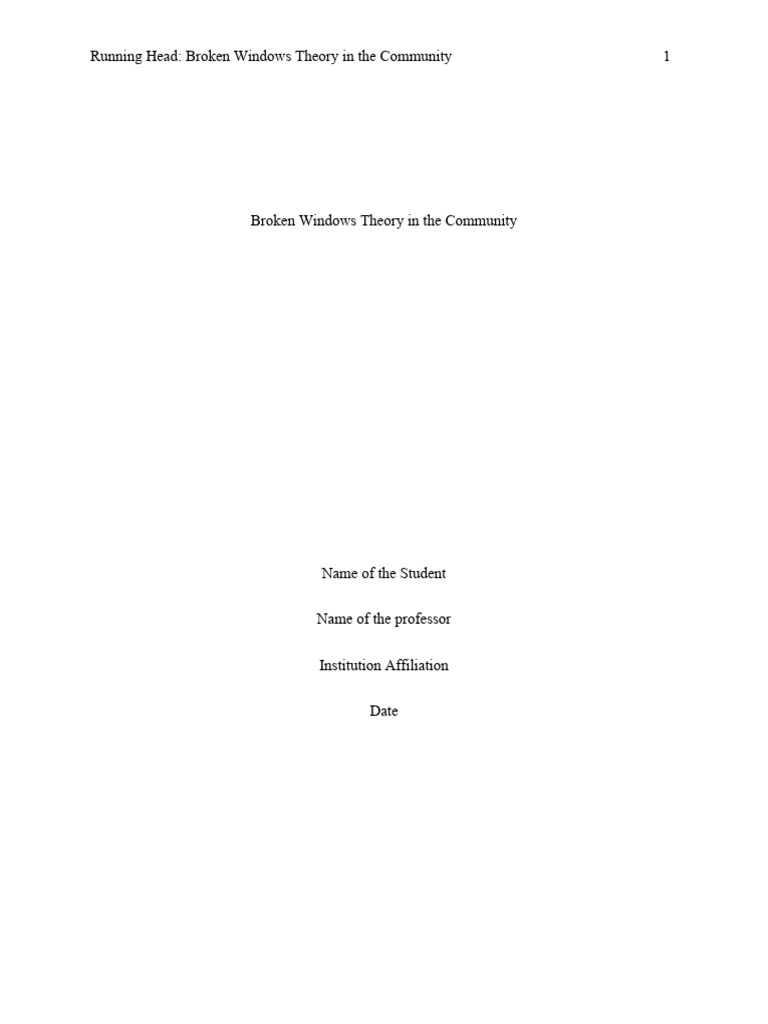In contemporary discussions surrounding criminology and community safety, the discourse often oscillates between punitive measures and rehabilitative approaches. The Broken Windows Theory, posited in the 1980s, advocates for the idea that visible signs of disorder and neglect incite further criminal behavior. This theory has garnered significant attention as policymakers and criminologists explore its implications for creating safer urban environments. However, when examining criminal justice through the lens of Bahá’í teachings, a compelling juxtaposition arises, one that invites us to rethink justice not merely as a system of punishment but as a manifestation of compassion and community integrity.
The essence of the Bahá’í teachings centers around the inherent dignity and worth of each individual. This foundation aligns harmoniously with the philosophy of rehabilitative rather than retributive justice. Fundamental to Bahá’í wisdom is the principle of the oneness of humanity—a belief that regards each person as a vital contributor to the collective welfare of society. In contrast, traditional interpretations of the Broken Windows Theory may inadvertently perpetuate a cycle of criminalization, wherein marginalized individuals are subjected to increasingly harsh punitive measures in reaction to societal disorder.
To understand how Bahá’í principles can augment discussions of justice, we must first delve into the comprehensive nature of community as perceived within this faith. The Bahá’í perspective advocates for a holistic approach to community well-being, wherein harmful behaviors are viewed not merely as violations of the law but as symptoms of deeper social malaise. By addressing these underlying issues—such as poverty, lack of education, and social disenfranchisement—communities can foster environments where the propensity for deviance diminishes naturally.
Another pertinent Bahá’í teaching is the imperative of education. Education is a crucial avenue through which societal betterment is achievable. By equipping individuals with the tools necessary for personal and communal development, the likelihood of engaging in criminal behavior is significantly reduced. This is especially relevant in neighborhoods where the Broken Windows Theory is often applied. Rather than focusing solely on the visible signs of disorder, Bahá’í teachings suggest a proactive investment in education—an approach that can transform the community landscape from one of fear and suspicion to one of hope and potential.
The Bahá’í emphasis on consultation and collective decision-making complements these ideas. Engaging members of the community in collaborative discussions fosters ownership and responsibility, mitigating feelings of alienation that can lead to criminal behavior. It is within these spheres of open dialogue that individuals can voice their concerns, articulate their needs, and contribute to the societal fabric in a meaningful way. A sense of belonging and purpose inevitably serves as a bulwark against the allure of antisocial activities.
Moreover, the Bahá’í teachings underscore the significance of compassion—a virtue that must permeate all interactions, including those between law enforcement and the community. By cultivating compassionate relations, we can reform the narrative surrounding justice. Police officers, functioning as guardians and facilitators of peace rather than enforcers of fear, can bridge the divide that often exists between law enforcement and the communities they serve. A compassionate approach does not equate to leniency; rather, it acknowledges the complexities of human behavior and the socio-economic contexts that often underlie criminal activities.
Further, restorative justice—a concept highly compatible with Bahá’í principles—advocates for the restoration of relationships and healing of communities affected by crime. This contrasts sharply with the punitive measures advocated by a strict interpretation of the Broken Windows Theory. Restorative justice pivots the focus from punishment to understanding the impacts of wrongdoing, thereby healing both the victim and the offender through mutual dialogue. This aligns with the Bahá’í emphasis on forgiveness and the necessity of repairing societal harms rather than merely seeking retribution.
It is also essential to consider the broader implications of addressing justice through a Bahá’í lens. As communities embrace these teachings, they not only contribute to local harmony but also to global progress towards peace and unity. The interconnectedness of society demands a holistic mindset toward justice that considers the ripple effects of our actions. A commitment to justice with compassion acknowledges that an unjust society ultimately impacts every individual, thus fostering a universal collective responsibility.
In conclusion, the intersection of Bahá’í teachings and the principle of the Broken Windows Theory invites an invigorating discourse on justice. By embracing an approach that prioritizes understanding, compassion, and community collaboration, we can transcend the limitations of traditional paradigms. The Bahá’í perspective encourages a rethinking of justice with compassion—one that recognizes the dignity of each individual and the potential for transformation rooted in shared humanity. It is through this lens that we can strive for a more just and equitable society, affirming the belief that justice, when coupled with compassion, is not only a legal imperative but a moral one. By centering our societal interactions around these principles, we can work towards a future where community integrity thrives, and the cycle of crime diminishes through understanding rather than punishment.
